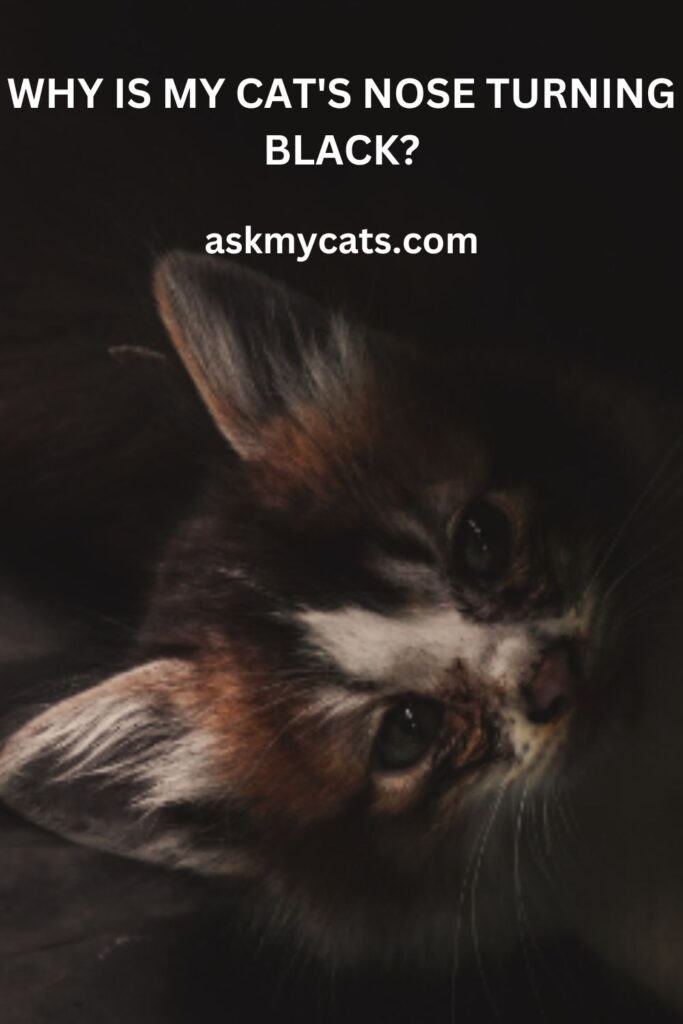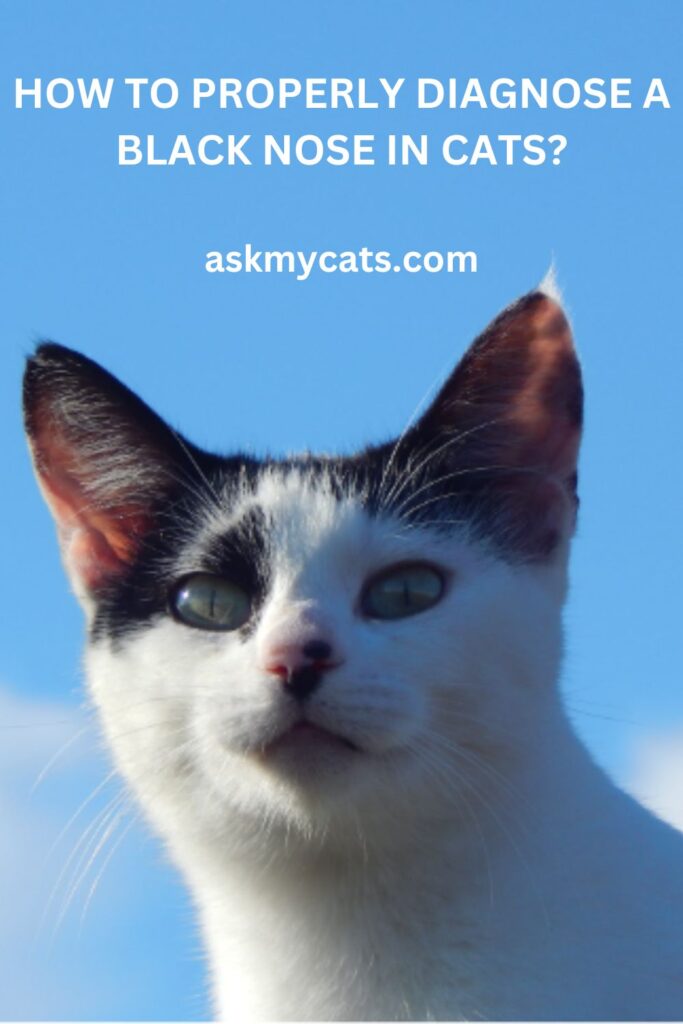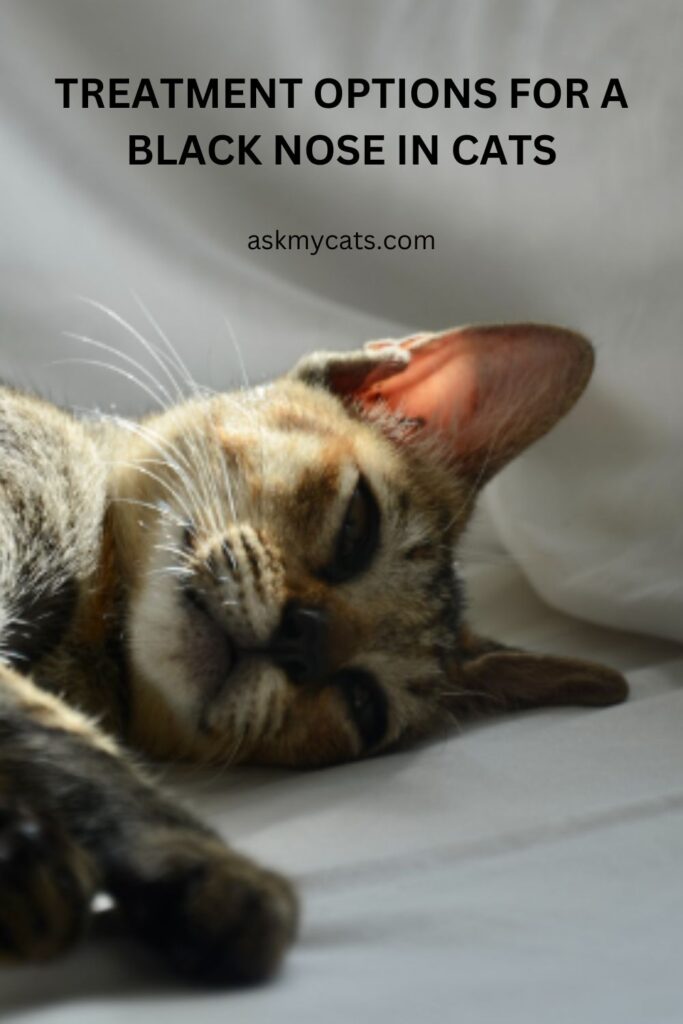Cats are known for their adorable pink noses that are always on the prowl for a good sniff.
However, if you notice your feline friend’s nose turning black, it could be cause for concern. While some cats naturally have black noses, a change in color could indicate an underlying health issue.
In this article, we’ll explore the various reasons why a cat’s nose might turn black and what you can do to keep your furry friend healthy and happy.
Key Takeaways
- Cats’ noses typically have a pink color, but a black nose could indicate a health issue.
- Natural causes of a black nose include aging, genetics, sun exposure, gender, and environmental factors.
- Medical conditions that can cause a black nose include nasal hyperkeratosis, autoimmune diseases, fungal infections, allergies, cancer, and vitamin E deficiency.
- Treatment options vary based on the condition and may involve ointments, medication, surgery, or supplementation.
- Treatment depends on the underlying cause and may include medication, dietary changes, or lifestyle modifications.


Give Your Cat the Perfect Day
Get the Free Ebook!
Why Is My Cat’s Nose Turning Black?

Here are 5 possible reasons why a cat’s nose may turn black:
- Genetics: Some cat breeds, such as Siamese, have a natural tendency to develop black noses as they age.
- Sun exposure: Cats with white or light-colored fur are more prone to sunburn, which can cause their noses to turn black as a protective measure.
- Allergies: Allergies can cause inflammation and hyperpigmentation of the nose, leading to a change in color.
- Nasal Hyperkeratosis: This condition causes the skin on the nose to become thickened, crusty, and sometimes discolored. It can be caused by a variety of factors, including viral infections and autoimmune disorders.
- Autoimmune diseases: Some autoimmune diseases can cause changes in skin pigmentation, including the nose. For example, lupus can cause a darkening of the nose and other parts of the face.
How To Properly Diagnose A Black Nose In Cats?

Diagnosing a black nose in cats will depend on the underlying cause.
Here are some steps a veterinarian may take to diagnose the cause of a black nose in cats:
- Physical examination: A veterinarian will perform a thorough physical examination of the cat, including the nose, to look for any signs of inflammation, infection, or other abnormalities.
- Medical history: The vet may ask about the cat’s medical history, including any previous illnesses or medications, to help narrow down possible causes.
- Allergy testing: If allergies are suspected, the vet may recommend allergy testing to identify the allergens triggering the reaction.
- Blood tests: Blood tests can help identify underlying health conditions, such as autoimmune diseases.
- Biopsy: In some cases, a biopsy of the nose may be necessary to determine the cause of the black nose. This involves taking a small tissue sample and examining it under a microscope.
Once a diagnosis is made, treatment will depend on the underlying cause. Treatment options may include medication, dietary changes, or lifestyle modifications to manage the condition and prevent further progression.
Remember: Never self-diagnose your cat!
Natural Causes Of A Black Nose In Cats
While a black nose in cats can be a sign of an underlying health issue, there are some natural causes of a black nose that do not require treatment. Here are some examples:
- Aging: As cats age, their noses may naturally darken in color. This is often seen in breeds such as Siamese.
- Genetics: Some cat breeds, such as Bombay and Burmese, naturally have black noses.
- Sun exposure: Cats with white or light-colored fur may develop a black nose as a protective measure against sunburn.
- Gender: Male cats may have darker noses than female cats due to hormonal differences.
- Environmental factors: Living in a certain environment may cause a cat’s nose to darken, such as being exposed to dirt, dust, or other contaminants.
It is important to note that while some causes of a black nose in cats may be natural and harmless, any sudden or unexplained changes in your cat’s nose color should be evaluated by a veterinarian to rule out any underlying health conditions.
Interesting Read: Why Is There A Black Spot On My Cat’s Nose?
Medical Conditions That Can Cause A Black Nose In Cats
There are several medical conditions that can cause a black nose in cats. Here are some examples:
- Nasal Hyperkeratosis: This condition causes the skin on the nose to become thickened, crusty, and sometimes discolored. It can be caused by a variety of factors, including viral infections and autoimmune disorders.
- Autoimmune diseases: Some autoimmune diseases can cause changes in skin pigmentation, including the nose. For example, lupus can cause a darkening of the nose and other parts of the face.
- Fungal Infections: Fungal infections can cause darkening of the nose and other areas of the skin.
- Allergies: Allergies can cause inflammation and hyperpigmentation of the nose, leading to a change in color.
- Cancer: Skin cancer, such as squamous cell carcinoma, can cause a black, crusty, or ulcerated nose.
- Vitamin E deficiency: A lack of vitamin E in a cat’s diet can lead to a condition known as “yellow fat disease,” which can cause the nose and other areas of the skin to darken.
Must Read: Why Do Cat Noses Change Color?
Treatment Options For A Black Nose In Cats

The treatment for a black nose in cats depends on the underlying cause.
Here are some possible treatment options:
- Nasal Hyperkeratosis: Treatment may involve softening and removing the crusty skin on the nose with ointments or special shampoos. In some cases, oral medication may be needed to control the condition.
- Autoimmune Diseases: Treatment for autoimmune diseases will vary depending on the specific condition. It may involve medication to suppress the immune system, such as corticosteroids or immunosuppressive drugs.
- Fungal Infections: Antifungal medications, either topical or oral, may be prescribed to treat fungal infections that cause a black nose.
- Allergies: Treatment for allergies may involve identifying and removing the allergen or using medication to control the symptoms. Antihistamines or corticosteroids may be prescribed by a veterinarian.
- Cancer: Treatment for skin cancer will depend on the type and severity of cancer. Treatment options may include surgery, chemotherapy, or radiation therapy.
- Vitamin E Deficiency: Treatment involves supplementing the cat’s diet with vitamin E. However, it is important to follow a veterinarian’s advice regarding dosage and duration of treatment.
Interesting Read: Why Is My Cat’s Nose Crusty And Black?
Home Remedies For A Black Nose In Cats
While there are no specific home remedies for a black nose in cats, there are some general measures you can take to help keep your cat’s nose healthy:
- Keep your cat hydrated: Ensure that your cat has access to clean, fresh water at all times to help maintain overall health and skin hydration.
- Provide a balanced diet: Feeding your cat a high-quality, balanced diet that meets their nutritional needs can help maintain skin and overall health.
- Groom your cat regularly: Regular grooming can help remove dirt and debris that can accumulate on the skin and cause inflammation.
- Protect your cat from the sun: If your cat has a light-colored or pink nose, it is important to protect it from the sun. Provide shade or use pet-safe sunscreen to prevent sunburn.
Interesting Read: Why Does Your Cat Have a White Nose?
Preventing A Black Nose In Cats
Preventing a black nose in cats can be difficult as some causes are natural or genetic, but here are some general measures that can help keep your cat’s nose healthy:
- Provide proper nutrition: A balanced diet with appropriate amounts of vitamins and minerals can help prevent some underlying conditions that can cause a black nose.
- Protect from the sun: If your cat has a light-colored or pink nose, keep them indoors during peak sun hours, or provide them with a shaded area outside to prevent sunburn.
- Keep your cat hydrated: Ensure that your cat has access to clean, fresh water at all times to help maintain overall health and skin hydration.
- Regular grooming: Regular grooming can help remove dirt and debris that can accumulate on the skin and cause inflammation.
- Provide a healthy environment: Ensure that your cat is kept in a clean environment to prevent exposure to contaminants that may cause nasal irritation and inflammation.
- Routine vet visits: Regular veterinary checkups can help detect early signs of medical conditions that may cause a black nose. Early detection and treatment can help prevent further progression.
Frequently Asked Questions
Is a black nose in cats normal?
Yes, a black nose is a normal color for many cat breeds.
Can a black nose in cats be a sign of illness?
Yes, a black nose can be a symptom of an underlying medical condition such as nasal hyperkeratosis or autoimmune disease.
Can a cat’s nose change color?
Yes, a cat’s nose can change color due to various reasons including natural causes, medical conditions, and even seasonal changes.
Can I use human sunscreen on my cat’s nose?
No, you should not use human sunscreen on your cat’s nose as some ingredients can be toxic to cats. Use pet-safe sunscreen specifically formulated for cats.
Should I be concerned if my cat’s nose is turning black?
It is best to have a veterinarian evaluate your cat’s nose if you notice any changes in color or texture. While a black nose can be normal, it can also be a symptom of an underlying medical condition that may require treatment.
Final Words
A black nose in cats can be normal, but it can also indicate an underlying medical condition that requires veterinary attention.
Preventative measures such as providing proper nutrition, protection from the sun, regular grooming, and routine vet visits can help maintain overall health and prevent some causes of a black nose.
If you notice any changes in your cat’s nose color or texture, it is best to have them evaluated by a veterinarian to determine the underlying cause and provide appropriate treatment.
